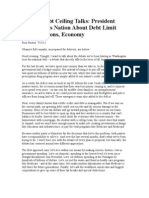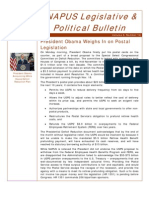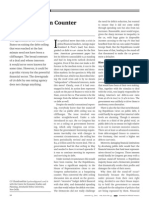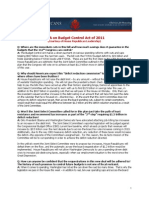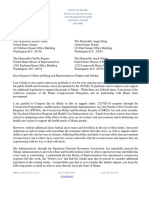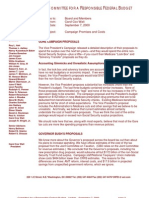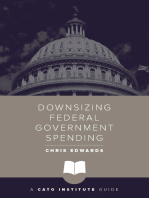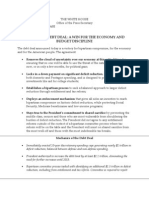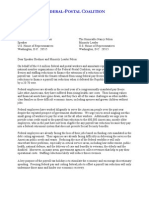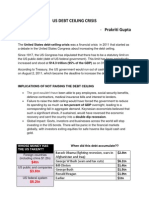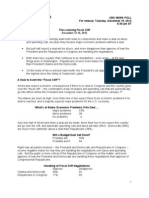Professional Documents
Culture Documents
Two Money Battles You Need To Follow
Uploaded by
Bruce MoyerOriginal Title
Copyright
Available Formats
Share this document
Did you find this document useful?
Is this content inappropriate?
Report this DocumentCopyright:
Available Formats
Two Money Battles You Need To Follow
Uploaded by
Bruce MoyerCopyright:
Available Formats
Legislative
Update
Bruce Moyer NAPS Legislative Counsel his summer, two battles are brewing in Washington, DC, over debt ceilings. The first involves how much the federal government can borrow; the other deals directly with the Postal Services own
Two Money Battles You Need to Follow
borrowing limit. Both battles have the potential to turn into deep crises. And both directly affect the interests of postal employees. First, a three-way confrontation among House Republicans, Senate Democrats and President Obama over the federal governments debt ceiling clearly has begun. On May 13, Treasury Secretary Tim Geithner officially notified Congress the federal government had hit its $14.3 trillion debt ceiling. His announcement means the U.S. Treasury cannot issue any more T-bills or debt instruments without additional borrowing authority granted by Congress. To get by in the short run, Geithner announced he would exercise extraordinary measures to use billions of dollars in the federal civil service pension fund and the FERS G-Fund to help pay the nations bills, a cash management approach permitted under federal law. The billions of dollars in these funds will be enough to keep the government running until Aug. 2, he predicted. After that date, without congressional lifting of the debt ceiling, the government will default on its trillions of dollars in obligations owed to lenders around the world, an unthinkable outcome that could throttle the
world economy. Is your pension money as a postal employee at risk? Not if the debt crisis is resolved without the governments default. The law requires the Treasury to repay any and all funds borrowed from the civil service pension fund and the G-Fund and to make both funds whole once the debt limit is increased. This happened before in 1996, 2002, 2003, 2004 and 2006 during debt ceiling episodes. Each time, Treasury repaid the borrowed funds, along with interest, after Congress reset the debt ceiling. What is less clear, however, is what it will take to resolve the debt ceiling standoff this time. Congressional Republicans insist on government spending cuts as large as any increase in the debt ceiling, but without any new taxes. House Democrats and the President say spending cuts alone are not enough. New revenues must be part of the equation. Is compromise between the parties possible? Compromise is the lubricant of politics, yet its in less supply these days in Washington than partisan brinksmanship. It should come as no surprise by now that spending cuts in a final debt ceiling deal could well include cuts in federal civil service retirement and health insurance benefits, along with changes in Medicare, Medicaid and Social Security. The Presidents debt commission late last year called for billions of dollars in savings through greater contributions by federal and postal employees toward their retirement and health insurance benefits. NAPS and other groups insist that private-sector workers in comparable jobs earn the same or even higher benefits than federal workers. Any cuts in federal civil service and postal benefits
need to be part of a broad debt-reduction package that involves fair and shared sacrifice by all able Americans, NAPS believes. The second brewing battle involves the Postal Service itself. The Postal Service is nearing its statutory limit of $15 billion in borrowing authority. The agency increasingly has warned that, without congressional action, it will default on its financial obligations by Sept. 30. The Postal Service is predicting a current fiscal year loss of at least $8 billion, compounded by two substantial payments due at the end of the year: a $5.5 billion payment to prefund retiree health benefits and a $1.2 billion payment for workers compensation claims. Unless Congress acts, the Postal Service likely will default on these payments to the federal government to conserve cash and continue operations as long as possible, the Postmaster General repeatedly has warned. If Congress fails to actand mail volume and revenues continue to decline and, as the USPS reaches its $15 billion debt ceilingthe Postal Service easily could reach a point in 2012 where it no longer can pay its employees or suppliers, requiring cutbacks in service. Without relief, the mail delivery system could grind to a halt, causing the fragile economy to take a dramatic hit. The solution? Congressional passage of H.R. 1351, legislation that could return to the Postal Service billions of dollars in CSRS pension overpayments and deploy those monies to satisfy USPS retiree health benefits prefunding obligations. Go to the NAPS website, www.naps. org, to send a message today to your member of Congress, asking him or her to co-sponsor H.R. 1351. Your job and the nations mail system depend on it. brumoyer@verizon.net
10 July 2011 / The Postal Supervisor
You might also like
- Raising The Debt Limit - Myth Versus FactDocument3 pagesRaising The Debt Limit - Myth Versus FactZim VicomNo ratings yet
- Running Out of Other People's Money: It's The Entitlements, StupidDocument4 pagesRunning Out of Other People's Money: It's The Entitlements, StupidLatinos Ready To VoteNo ratings yet
- Campaign 2012: The Deficit, Ron HaskinsDocument10 pagesCampaign 2012: The Deficit, Ron HaskinsdevonvsmithNo ratings yet
- The Real Causes of Deficits and The US DebtDocument4 pagesThe Real Causes of Deficits and The US DebtVincentNo ratings yet
- US Debt CeilingDocument2 pagesUS Debt CeilingmathiarasuNo ratings yet
- Fiscal Cliff Economic Impact (2013)Document14 pagesFiscal Cliff Economic Impact (2013)Winston M HenryNo ratings yet
- Debt Ceiling MemoDocument5 pagesDebt Ceiling MemoMichael GinsbergNo ratings yet
- Campaign 2012: The Deficit, Isabel SawhillDocument4 pagesCampaign 2012: The Deficit, Isabel SawhilldevonvsmithNo ratings yet
- What The Debt Ceiling Means For Social Security and More - The New York TimesDocument3 pagesWhat The Debt Ceiling Means For Social Security and More - The New York TimesCesar Augusto CarmenNo ratings yet
- Fed-Postal LTR To Supercommittee 09-28-11Document3 pagesFed-Postal LTR To Supercommittee 09-28-11Bruce MoyerNo ratings yet
- Debt Limit 101Document5 pagesDebt Limit 101Center for American ProgressNo ratings yet
- 2011-05-16 News Economy Debt Ceiling DeadlDocument4 pages2011-05-16 News Economy Debt Ceiling DeadlfaheemshelotNo ratings yet
- Ivan Osorio - The Battle For New England - Labor Watch 3-12Document8 pagesIvan Osorio - The Battle For New England - Labor Watch 3-12Competitive Enterprise InstituteNo ratings yet
- Facing The Fiscal CliffDocument4 pagesFacing The Fiscal Clifflps2001No ratings yet
- 01-12-09 AlterNet-Note To Obama - Thinking Small Will Lead To Disaster by Robert KuttnerDocument3 pages01-12-09 AlterNet-Note To Obama - Thinking Small Will Lead To Disaster by Robert KuttnerMark WelkieNo ratings yet
- Obama Debt Ceiling TalksDocument5 pagesObama Debt Ceiling TalksTobaccoVietnamNo ratings yet
- The Freedom Agenda: Why a Balanced Budget Amendment is Necessary to Restore Constitutional GovernmentFrom EverandThe Freedom Agenda: Why a Balanced Budget Amendment is Necessary to Restore Constitutional GovernmentNo ratings yet
- Sessions Issues Opening Statement at Budget Committee Mark-UpDocument4 pagesSessions Issues Opening Statement at Budget Committee Mark-Upapi-127658921No ratings yet
- Obamacare Is UNCONSTITUTIONAL & COMMUNISTICDocument263 pagesObamacare Is UNCONSTITUTIONAL & COMMUNISTICLevitator50% (2)
- Slater Best Guess Issue 2 Article For WebsiteDocument2 pagesSlater Best Guess Issue 2 Article For Websiteapi-400507461No ratings yet
- Winning Easy; Governing HardDocument4 pagesWinning Easy; Governing HardMichael BenzingerNo ratings yet
- 02-04-08 CQ-Bush's Budget Faces Hostile Reception On CapitolDocument4 pages02-04-08 CQ-Bush's Budget Faces Hostile Reception On CapitolMark WelkieNo ratings yet
- Results To Survey Collected On 6 24 11 Suggestions For Federal Regulation CutsDocument8 pagesResults To Survey Collected On 6 24 11 Suggestions For Federal Regulation Cutskelly1477No ratings yet
- LAN01-#213900-V1-What Should We Expect From Our Next GovernorDocument3 pagesLAN01-#213900-V1-What Should We Expect From Our Next GovernorRichard D. McLellanNo ratings yet
- Wage Subsidies: A Multi-Trillion Dollar Market Distortion That America Cannot AffordDocument13 pagesWage Subsidies: A Multi-Trillion Dollar Market Distortion That America Cannot AffordJason PyeNo ratings yet
- Nov 2022 Perspective On InflationDocument3 pagesNov 2022 Perspective On InflationDennis McDermottNo ratings yet
- Stimulus Package Provides USPS No Funding, Postal Service Could Shutter by June 2020 Amid Coronavirus - FortuneDocument6 pagesStimulus Package Provides USPS No Funding, Postal Service Could Shutter by June 2020 Amid Coronavirus - FortuneChristopher A. SearsNo ratings yet
- INFORMATION - Rep. Gosar Op-Ed in Breitbart News On Sequester Solution - 2 Percent Federal Pay Cut Across The Board - Google GroupsDocument2 pagesINFORMATION - Rep. Gosar Op-Ed in Breitbart News On Sequester Solution - 2 Percent Federal Pay Cut Across The Board - Google GroupsBreitbart UnmaskedNo ratings yet
- Zero Draft Government ShutdownDocument6 pagesZero Draft Government Shutdownapi-241419507No ratings yet
- Bankrupt: Entitlements and The Federal Budget, Cato Policy Analysis No. 673Document36 pagesBankrupt: Entitlements and The Federal Budget, Cato Policy Analysis No. 673Cato InstituteNo ratings yet
- Joe Biden S New Spending PolicyDocument2 pagesJoe Biden S New Spending PolicyCladius DevrouNo ratings yet
- Issue BriefDocument14 pagesIssue Briefapi-316754061No ratings yet
- The Fiscal Cliff ExplainedDocument14 pagesThe Fiscal Cliff ExplainedasfawmNo ratings yet
- U.S.-Style Fiscal Federalism Buffers State and Local Governments From Another Federal Shutdown - SomewhatDocument6 pagesU.S.-Style Fiscal Federalism Buffers State and Local Governments From Another Federal Shutdown - Somewhatapi-227433089No ratings yet
- Opinion - The Coronavirus Leaves The State of The States DireDocument2 pagesOpinion - The Coronavirus Leaves The State of The States DirejakeNo ratings yet
- Economist Insights 2013 10 072Document2 pagesEconomist Insights 2013 10 072buyanalystlondonNo ratings yet
- Obama's Full Address On Debt Ceiling ImpasseDocument6 pagesObama's Full Address On Debt Ceiling ImpasseJohn SmithNo ratings yet
- Daily Tel ObamaDocument4 pagesDaily Tel ObamaDonato PaglionicoNo ratings yet
- April Fools MN House Week in ReviewDocument6 pagesApril Fools MN House Week in ReviewquantataNo ratings yet
- UI Letter To CongressDocument2 pagesUI Letter To CongressChris Berinato100% (11)
- Shutting Out The Progressive Agenda - FrontlineDocument2 pagesShutting Out The Progressive Agenda - FrontlineMahesh BabuNo ratings yet
- 2011 EUA Crise Teto Da DívidaDocument12 pages2011 EUA Crise Teto Da DívidaGabriel LaguerraNo ratings yet
- eNAPUS 9-19-2011Document2 pageseNAPUS 9-19-2011bsheehanNo ratings yet
- What Is The Fiscal CliffDocument6 pagesWhat Is The Fiscal CliffGS EthicsNo ratings yet
- Debt Limit BoehnerDocument2 pagesDebt Limit BoehnerBrett LoGiuratoNo ratings yet
- Holtzeakin Testimony 4oct2011Document12 pagesHoltzeakin Testimony 4oct2011Committee For a Responsible Federal BudgetNo ratings yet
- Washington DC - Jan 10 2013Document1 pageWashington DC - Jan 10 2013citybizlist11No ratings yet
- US Fiscal Debate Has Worldwide Implications.Document2 pagesUS Fiscal Debate Has Worldwide Implications.solo66No ratings yet
- Tax MythsDocument8 pagesTax MythsPatricia Carlson GuttaNo ratings yet
- Danske Markets - US Debt Default Unlikely 20110727Document10 pagesDanske Markets - US Debt Default Unlikely 20110727SynergyFinanceNo ratings yet
- Debt As Bargain CounterDocument2 pagesDebt As Bargain CounterGagandeep SinghNo ratings yet
- QA On Budget Control Act of 2011 (Aug 1 2011)Document5 pagesQA On Budget Control Act of 2011 (Aug 1 2011)Catherine SnowNo ratings yet
- 05 - 14 - 2020 CRF Mills Delegation LetterDocument4 pages05 - 14 - 2020 CRF Mills Delegation LetterNEWS CENTER MaineNo ratings yet
- Update 9 7 00Document2 pagesUpdate 9 7 00Committee For a Responsible Federal BudgetNo ratings yet
- Donald's DefaultDocument12 pagesDonald's DefaultCenter for American ProgressNo ratings yet
- 24-02-11 David Cay Johnston - Really Bad Reporting in Wisconsin-Who 'Contributes' To Public Workers' PensionsDocument8 pages24-02-11 David Cay Johnston - Really Bad Reporting in Wisconsin-Who 'Contributes' To Public Workers' PensionsWilliam J GreenbergNo ratings yet
- Floor Speech of Sen. Charles Grassley Regarding Blue Slip Courtesy, November 13, 2017Document2 pagesFloor Speech of Sen. Charles Grassley Regarding Blue Slip Courtesy, November 13, 2017Bruce MoyerNo ratings yet
- Sen. Collins On Postal ReformDocument3 pagesSen. Collins On Postal ReformBruce MoyerNo ratings yet
- NAPS 2012 LTS Program AgendaDocument2 pagesNAPS 2012 LTS Program AgendaBruce MoyerNo ratings yet
- 2012 Congressional CalendarDocument1 page2012 Congressional CalendarBruce MoyerNo ratings yet
- Pending Postal Reform LegislationDocument6 pagesPending Postal Reform LegislationBruce MoyerNo ratings yet
- National Assoc. of Postal Supervisors - 2012 Legislative BriefingDocument16 pagesNational Assoc. of Postal Supervisors - 2012 Legislative BriefingBruce MoyerNo ratings yet
- Federal-Postal Coalition Letter Opposing Reduction of Federal Retirement Benefits - February 10, 2012Document2 pagesFederal-Postal Coalition Letter Opposing Reduction of Federal Retirement Benefits - February 10, 2012Bruce MoyerNo ratings yet
- NAPS Assessment of HR 2309, Postal Reform Act of 2011Document5 pagesNAPS Assessment of HR 2309, Postal Reform Act of 2011Bruce MoyerNo ratings yet
- Leetter From 27 Senators Urging Improvements in Postal Bill, Feb. 14, 2012Document5 pagesLeetter From 27 Senators Urging Improvements in Postal Bill, Feb. 14, 2012Bruce MoyerNo ratings yet
- NAPS Assessment of S. 1789Document8 pagesNAPS Assessment of S. 1789Bruce MoyerNo ratings yet
- NAPS Statement On Postal Service Plan To Reduce Delivery Standards, Slow Down MailDocument2 pagesNAPS Statement On Postal Service Plan To Reduce Delivery Standards, Slow Down MailBruce MoyerNo ratings yet
- Is Warrantless GPS Surveillance Constitutional?Document1 pageIs Warrantless GPS Surveillance Constitutional?Bruce MoyerNo ratings yet
- Fact Sheet On Budget Control Act of 2011Document5 pagesFact Sheet On Budget Control Act of 2011Bruce MoyerNo ratings yet
- Fed-Postal LTR To Supercommittee 10-20-11Document5 pagesFed-Postal LTR To Supercommittee 10-20-11Bruce MoyerNo ratings yet
- Letter From 22 Senators Urging Moratorium in The Closure of Postal FacilitiesDocument3 pagesLetter From 22 Senators Urging Moratorium in The Closure of Postal FacilitiesBruce MoyerNo ratings yet
- NAPS Endorsement - HR 1262Document1 pageNAPS Endorsement - HR 1262Bruce MoyerNo ratings yet
- Federal-Postal Coalition Letter Opposing Pay Freeze Extension, Workforce ReductionsDocument2 pagesFederal-Postal Coalition Letter Opposing Pay Freeze Extension, Workforce ReductionsBruce MoyerNo ratings yet
- Fed-Postal LTR To Supercommittee 09-28-11Document3 pagesFed-Postal LTR To Supercommittee 09-28-11Bruce MoyerNo ratings yet
- S.1010 - POST ActDocument31 pagesS.1010 - POST ActBruce MoyerNo ratings yet
- Section by Section BCA 2011Document9 pagesSection by Section BCA 2011Barmak NassirianNo ratings yet
- NAPS Statement On Postal Service Proposals Regarding Retirement and Health Care Plans, August 12, 2011Document1 pageNAPS Statement On Postal Service Proposals Regarding Retirement and Health Care Plans, August 12, 2011Bruce MoyerNo ratings yet
- Two Money Battles You Need To FollowDocument1 pageTwo Money Battles You Need To FollowBruce MoyerNo ratings yet
- Statement of Naps President Louis M. Atkins On Usps Suspension of Fers ContributionsDocument1 pageStatement of Naps President Louis M. Atkins On Usps Suspension of Fers ContributionsBruce MoyerNo ratings yet
- NAPS LTS - Congressional Visit Talking Points 2011Document7 pagesNAPS LTS - Congressional Visit Talking Points 2011Bruce MoyerNo ratings yet
- H.R. 1351 - USPS Pension Obligation Recalculation and Restoration Act of 2011Document7 pagesH.R. 1351 - USPS Pension Obligation Recalculation and Restoration Act of 2011Bruce MoyerNo ratings yet
- 10-07-2013Document20 pages10-07-2013cn_cadillacmiNo ratings yet
- Grant's Interest Rate Observer X-Mas IssueDocument27 pagesGrant's Interest Rate Observer X-Mas IssueCanadianValueNo ratings yet
- Gonzales Cannon Jan. 17 IssueDocument22 pagesGonzales Cannon Jan. 17 IssueGonzales CannonNo ratings yet
- A Primer On MoneyDocument74 pagesA Primer On MoneyaspharagusNo ratings yet
- Debt Limit 101Document5 pagesDebt Limit 101Center for American ProgressNo ratings yet
- Debt Ceiling - 0131Document3 pagesDebt Ceiling - 0131Washington ExaminerNo ratings yet
- DH 0725Document16 pagesDH 0725The Delphos HeraldNo ratings yet
- Full Faith & Credit ActDocument6 pagesFull Faith & Credit ActRoy Tanner100% (2)
- Articulate English May-2023Document88 pagesArticulate English May-2023Rani KumariNo ratings yet
- Master - CPAC 2023 Survey 3-1-23 PresentationDocument21 pagesMaster - CPAC 2023 Survey 3-1-23 PresentationWashington ExaminerNo ratings yet
- Hustler USA - Anniversary 2023Document138 pagesHustler USA - Anniversary 2023ธนวัฒน์ ปิยะวิสุทธิกุล67% (6)
- Articulate English May-2023Document92 pagesArticulate English May-2023Mayank RajpootNo ratings yet
- Barclays On Debt CeilingDocument13 pagesBarclays On Debt CeilingafonteveNo ratings yet
- The Bridge, March 1, 2012Document28 pagesThe Bridge, March 1, 2012The BridgeNo ratings yet
- Fiscal Space: Special ReportDocument19 pagesFiscal Space: Special ReportNgô Túc HòaNo ratings yet
- Us Debt Ceiling Crisis 1Document5 pagesUs Debt Ceiling Crisis 1Prakriti GuptaNo ratings yet
- Smart InvestmentDocument82 pagesSmart InvestmentJitesh KattaNo ratings yet
- House Budget Committee Republicans Letter On Debt LimitDocument4 pagesHouse Budget Committee Republicans Letter On Debt LimitFox NewsNo ratings yet
- CBS News Poll: Fiscal CliffDocument14 pagesCBS News Poll: Fiscal CliffCBS_News0% (1)
- Financial Report 2013 Ghandhara NissanDocument123 pagesFinancial Report 2013 Ghandhara NissanSarfraz AliNo ratings yet
- He Aily Nion: Junction CityDocument24 pagesHe Aily Nion: Junction CityDUNewsNo ratings yet
- Germany Urges Intel To Expand Plans For 17bn Chip FactoryDocument16 pagesGermany Urges Intel To Expand Plans For 17bn Chip FactoryMuhammad MustaphaNo ratings yet
- Morning: Ringgit Hits Fresh Low 3.4103Document25 pagesMorning: Ringgit Hits Fresh Low 3.4103LimNo ratings yet
- Cbsnews 20230611 1Document59 pagesCbsnews 20230611 1Caroline Linton100% (1)
- Hoover Digest, 2013, No. 2, SpringDocument192 pagesHoover Digest, 2013, No. 2, SpringHoover InstitutionNo ratings yet
- MC 0728Document16 pagesMC 0728mcchronicleNo ratings yet
- Pat Meehan ClipbookDocument17 pagesPat Meehan ClipbookNortheastClipbookNo ratings yet
- 01-07-2010 Operation Still Point Christopher StoryDocument42 pages01-07-2010 Operation Still Point Christopher Storylorenehaggard5319No ratings yet
- Obama Debt Ceiling TalksDocument5 pagesObama Debt Ceiling TalksTobaccoVietnamNo ratings yet


















